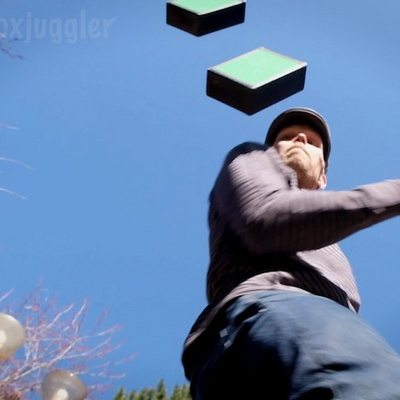Creation Space for Creative Projects: 3 Tips
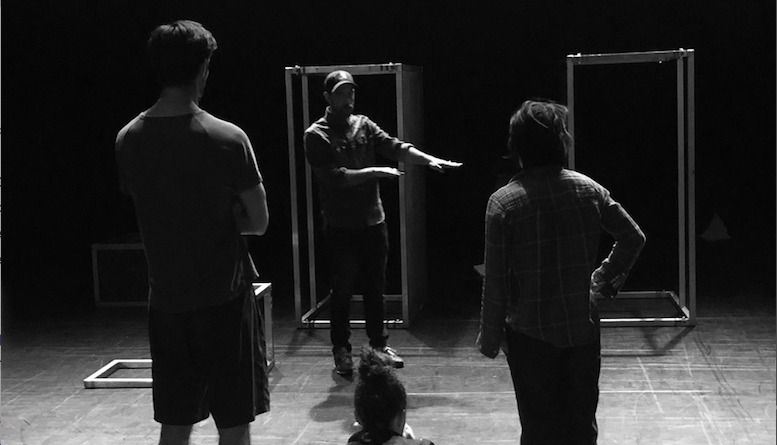
Finding space for your project can be a bigger challenge than you might expect. Circus projects especially tend to have more needs (rigging, height, mats) than just an empty room, and while training spaces with these requirements exist, finding a private one for your team can prove difficult. Here are 3 tips for finding the right space for your next project.
Book Early
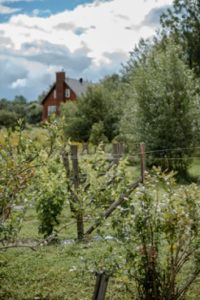
There are residency spaces dedicated to supporting artists’ creations, but like theatres and gigs, they tend to book in advance. If you’re hoping to make a project and not spend a fortune renting rehearsal and theatre space, you need to plan well ahead of time. Especially if you’re in the first, exploratory phase of your project with less stringent requirements, diving in will be more important than having everything perfect. The information you’ll gain from trying out those first ideas will help you figure out exactly what you’ll need during a longer, more in-depth residency.
If you do plan ahead, it’s often possible to get up to a three-week residency relatively affordably. And believe me, that focused time in the same location where all you’re doing is creating your show ismuch more productive than fragmented creation time.
.
Private Space= Valuable Space
When we did our first exploratory workshops for Sweat & Ink we got a residency through En Piste at the National Circus School (ENC) in Montreal which gave us a reduced rate for 3 hours a day for two months. However, if we also wanted technical training time we had to book that separately, or do it somewhere else since ENC had classes during the day. This meant we would often train in the morning at Cirque Eloize (which involved bringing our Russian bar, hoop, boxes and teeterboard down to the Old Port), then pack it all up in my girlfriend’s Yaris (if it was available!), eat lunch, drive across the city to ENC while doing emails in the car, unpack everything, bring it all upstairs to the creation studio, set it up, train for three hours, take it all down, pack it back into the car and bring it to one of our apartments for the night. Not ideal.
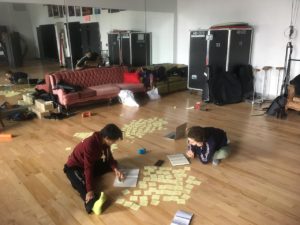
Sometimes we managed to schedule better to avoid some of this back-and-forth craziness, but we didn’t always have a choice- we were tied to the availabilities we could get.
When we finally found a two-week residency space out of the city it was a blessing because we could focus only on the show: all the space-related headaches of logistics, travel, coordination and scheduling disappeared. We could train as late as we wanted and leave everything where it was, ready to start up the next morning. More of our day could be spent working on the show instead of driving around the city and scheduling rides.
The other advantage of finding a dedicated space is that it’s a distraction-free environment. Trying to get into a creative zone with people watching you, or with other people training nearby, or where all your friends are around wanting to make plans and catch up; all of it will eat into your ability to focus on your project and make huge strides.
Not Always Close to Home
Here’s my top tip for finding dedicated space like this, a tip that was echoed by many other creators I talked to:The best creation space for you is not always close to home.
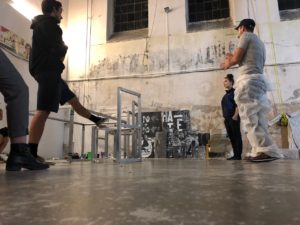
What you sacrifice in the convenience of sleeping in your own bed will come back to you tenfold in the benefits of getting to install somewhere to burrow into your project.
After Eloize and ENC we did two weeks of creation at a barn up near Quebec City, then performed a pre-premiere at the Fringearts theatre in Philadelphia, USA where we were able to use their theatre for 10 days before the show (note: We got that residency in Philly by having a booth at Montreal Completement Cirque six months prior. Plan ahead!).
A year after that, we did another month and a half of creation in Jatka78, a theatre located in Prague-in the Czech Republic. Was it a big coordination effort to get over there, and did it cost money to ship our stuff there? Absolutely. But it gave us a month and a half to dive into our project with zero distractions, and at the end of our residency we had the opportunity to play for three nights to an audience where European agents and producers could see the show. Plus, our set was already in Europe for when we needed it.
….
Bonus tip: Frequently you’ll get into an empty space, and there’s no stuff to play with. If you have ideas for your show, see if you can bring in elements to play with, at least prototype versions- if you need a table, find a table, if you have an idea with sand, get some sand. Figure out how to test your ideas so they don’t stay in the imaginary realm.
Extra bonus tip: If you’re looking for space in the Quebec province, you’re in luck. A new residency space, Hors Champs is opening up about an hour and a half from Montreal or Quebec City. We did our first workshop forBranché there, Barcode’s collaboration with Acting for Climate Montreal, and it was great. Book it before you need it (Tip 1!), all bookings are reimbursable if cancelled due to Covid restrictions.
..
.
All photos provided courtesy of Eric Bates and Bardcode.
..
Did you know?
The CircusTalk Industry Directory has 600+ training spaces listed from all over the world.
CircusTalk PRO members can search by location and access profile details.
Do you own a school or training space?
Add your training space to our database for FREE and artists will find you for their training needs!
..
..
Editor's Note: At StageLync, an international platform for the performing arts, we celebrate the diversity of our writers' backgrounds. We recognize and support their choice to use either American or British English in their articles, respecting their individual preferences and origins. This policy allows us to embrace a wide range of linguistic expressions, enriching our content and reflecting the global nature of our community.
🎧 Join us on the StageLync Podcast for inspiring stories from the world of performing arts! Tune in to hear from the creative minds who bring magic to life, both onstage and behind the scenes. 🎙️ 👉 Listen now!
